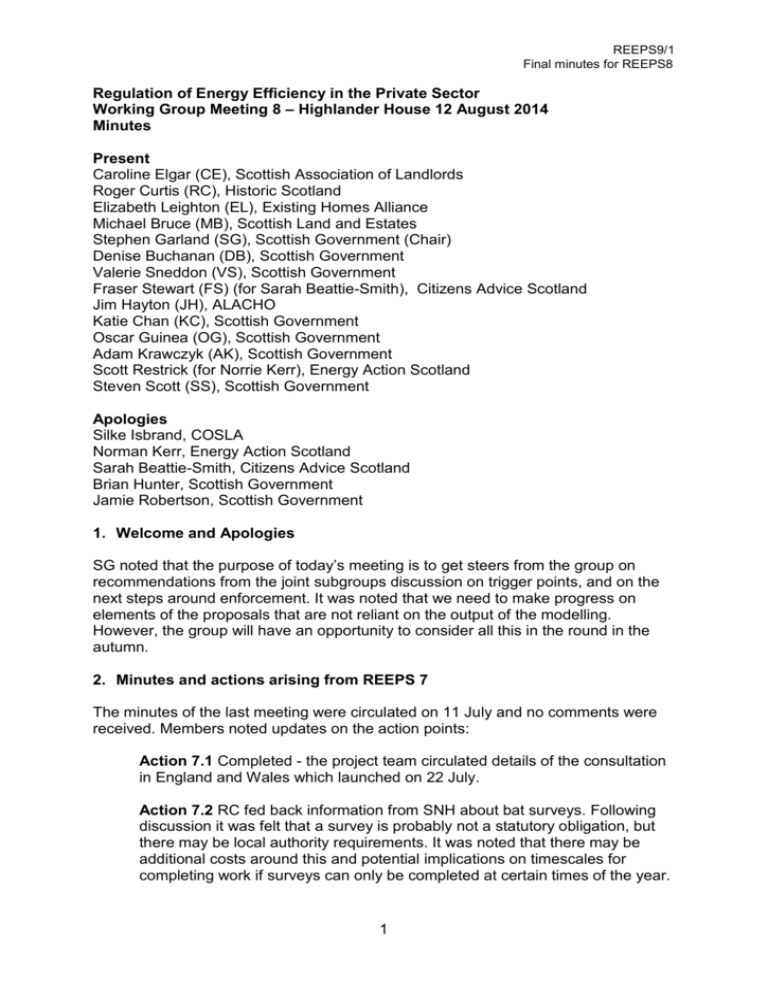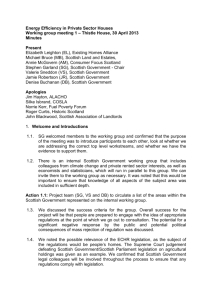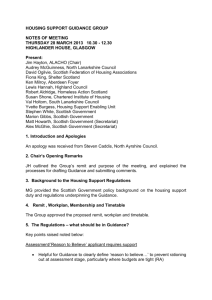Open - The Scottish Government
advertisement

REEPS9/1 Final minutes for REEPS8 Regulation of Energy Efficiency in the Private Sector Working Group Meeting 8 – Highlander House 12 August 2014 Minutes Present Caroline Elgar (CE), Scottish Association of Landlords Roger Curtis (RC), Historic Scotland Elizabeth Leighton (EL), Existing Homes Alliance Michael Bruce (MB), Scottish Land and Estates Stephen Garland (SG), Scottish Government (Chair) Denise Buchanan (DB), Scottish Government Valerie Sneddon (VS), Scottish Government Fraser Stewart (FS) (for Sarah Beattie-Smith), Citizens Advice Scotland Jim Hayton (JH), ALACHO Katie Chan (KC), Scottish Government Oscar Guinea (OG), Scottish Government Adam Krawczyk (AK), Scottish Government Scott Restrick (for Norrie Kerr), Energy Action Scotland Steven Scott (SS), Scottish Government Apologies Silke Isbrand, COSLA Norman Kerr, Energy Action Scotland Sarah Beattie-Smith, Citizens Advice Scotland Brian Hunter, Scottish Government Jamie Robertson, Scottish Government 1. Welcome and Apologies SG noted that the purpose of today’s meeting is to get steers from the group on recommendations from the joint subgroups discussion on trigger points, and on the next steps around enforcement. It was noted that we need to make progress on elements of the proposals that are not reliant on the output of the modelling. However, the group will have an opportunity to consider all this in the round in the autumn. 2. Minutes and actions arising from REEPS 7 The minutes of the last meeting were circulated on 11 July and no comments were received. Members noted updates on the action points: Action 7.1 Completed - the project team circulated details of the consultation in England and Wales which launched on 22 July. Action 7.2 RC fed back information from SNH about bat surveys. Following discussion it was felt that a survey is probably not a statutory obligation, but there may be local authority requirements. It was noted that there may be additional costs around this and potential implications on timescales for completing work if surveys can only be completed at certain times of the year. 1 REEPS9/1 Final minutes for REEPS8 Action 8.1 To note - possible implications of bats to timescales/costs of work can be considered when REEPS comes to discuss possible exemptions/ abeyances, as appropriate. Action 7.3 Completed - The reference to Consumer Focus was amended to Consumer Futures in the minutes of REEPS 6. Action 7.4 It was noted that the research referred to by Building Standards Division was based on new build and is a work in progress. SS will feedback on progress as appropriate in due course. It was noted that ventilation continues to be a live issue for REEPS (with reference to Action 6.2), and that this can be picked up in terms of looking at the processes required to provide advice on how to meet the REEPS standard. PAS 2030 was also referred to as being potentially of interest to REEPS members. Action 8.2 To note - project team will forward Building Standards report if it becomes available during the course of the REEPS project. Action 8.3 PULSE report to be circulated to members of REEPS and RAG. Action 7.5 The project team confirmed that there is a UK wide process for amending SAP. Further work is being done to consider how to feed issues raised by the REEPS discussions into that process, and REEPS may want to take SAP timescales into account, for example when considering lead-in times. The group agreed RAG’s approach that it would be best to use SAP for modelling, while noting its shortcomings, which should be raised through the Technical subgroup. Action 7.6 It was noted that agenda items 4, 5 and 6 would pick up on the action around providing an update on stakeholder engagement. Action 7.7 The doodle poll for a session with the contractors has not been sent yet but will be once the project team has discussed further with contractors. Action 8.4 Project team will confirm aims of session with contractors and send doodle poll to members in due course. 3. Update from project team Modelling AK updated the group with progress on modelling. There are c400,000 properties in bands E, F and G in Scotland, with a higher prevalence in private sector, detached and pre-1919 stock. Typologies have been signed off, with 358 archetypes. This approach will cover 91% of properties, with the remainder being assigned to the closest match. A hierarchy of measures has also been suggested for modelling, and the contractors have made suggestions on costs including auxiliary costs and additional costs for 2 REEPS9/1 Final minutes for REEPS8 rural areas. AK has received comments on the second draft of the report and is reviewing these. The modelling is behind schedule at the moment as phase 1 has not been signed off. However, given that the modelling process is automated and some of the information being produced as part of Phase 1 is moving into elements of phase 2, it is likely that the contractors will be able to bring the project back on track. AK will continue to monitor this with the contractors with the intention being of signing off Phase 1 around late August. REEPS members should continue to feed any issues through RAG members. DECC consultation – update VS updated the group on the DECC consultation on Private Rented Sector Energy Efficiency Regulations (Domestic) which was launched on 22 July. VS reported back on a consultation event she attended and noted the following key points (noting that these did not constitute formal responses to the consultation): there were similar interests and issues to those being discussed by REEPS. one of the proposals is to have a “backstop” date from when all PRS. properties will have to meet minimum standards, provided that there is an existing EPC. There was some discussion at the event as to what would be an appropriate timescale for this. the consultation is seeking views on whether there should be a trajectory, with some support that it would provide a clear direction on future standards. there were different views as to whether the proposed exemptions were the right ones, and if there were too many. There was also some discussion about the commitment in the consultation that there will be no upfront costs to landlords. It was suggested by one attendee that there would be benefit in also looking at owner occupiers. It was noted that while the PRS energy efficiency regulations do not have a trajectory, the new fuel poverty strategy (for England only) does have a trajectory. There are two other DECC consultations running, on the English fuel poverty strategy and energy efficiency regulations for the non-domestic sector. Action 8.5 Project team will seek clarification as to whether these proposals also affect Wales, and if so, what organisations are responding. 4. Trigger points VS introduced Paper 8/2 and fed back from the recent subgroups joint workshop, which looked at trigger points and enforcement. The subgroups purposely took the simplest situations for point of sale and rental to establish principles, and further work will then be done to look at exemptions. Other trigger points can be explored in the communications plan to support REEPS or could be considered for a later date. The group agreed the 4 recommendations in the paper, and also noted the following points: 3 REEPS9/1 Final minutes for REEPS8 Backstop date for introducing minimum standards could be considered for properties in the PRS (with the caveat that there may need to be provision for landlords where tenants refuse access). A backstop date would be more difficult to apply for owner occupiers. Some concern was expressed that there has not been sufficient research done on the impact on the market of sale and rental as trigger points, for example in relation to owners in negative equity. However, it was noted that any agreement at this stage is around principles, and that further work will be done to explore possible effects of using sale and rental as trigger points (noting also that some measures could add value to a property). The communications plan provides an opportunity to consider ways to encourage voluntary improvements to support the work of REEPS. Most of the group agreed with the principle of progressing the point of sale or rental as primary triggers for regulation. The group asked that legislation be framed as positively as possible and that the possibility of incentives, such as council tax exemptions (eg for early adopters), is explored. SLE noted that it cannot recommend following the proposed trigger points to its members at this stage as the full investigation of all issues had not yet been completed. SLE would continue to engage with the process, but would like the REEPS group to consider the “voluntary principle” and alternative enabling legislation, such as “cap and trade” or LBTT allowances in order to bring in resources to support investment in improvement measures. It was noted that the agreed remit of the group is to develop proposals for minimum standards, but that the Wider Context subgroup’s interest in “fit with incentives” provided an opportunity for these issues to be suggested. It was also suggested that REEPS consider whether a pilot phase would be possible to examine the possible impact of proposals on different parts of the housing system. It was noted that the Scottish Household Survey includes statistics on how long people have been in their current homes – this could be useful in helping gauge turnover of stock and therefore impact of any draft standards. There are potential implications in imposing increased burdens for local authorities in enforcement when using sale and rental as trigger points. Discussions with local authorities and COSLA will be important. To this end, a workshop session will be arranged with wider participation from local authorities, in particular to explore these issues. It was noted that the way in which the standard is set may affect the enforcement processes (for example whether need technical skills or administration skills to enforce). Action 8.6 Project team to set up a workshop with wider participation, particularly from local authorities, to explore issues such as potential enforcement routes, and the role of local authorities, incentives and individuals. This workshop will provide the 4 REEPS9/1 Final minutes for REEPS8 opportunity to work through the processes that might be needed to support regulation. Action 8.7 Project team will explore opportunities for Citizens Advice Scotland (CAS) and/or EST to carry out focus groups (or similar) to support this phase. 5. Enforcement route – sale KC introduce Paper 8/3 on enforcement routes for sale. The paper outlined the discussion from the recent joint subgroup session, and identified suggested areas for further work. It was noted that the recommendations were based on a straightforward sale process to establish the principles for enforcement, and that further work would be done to explore other “what if” situations of the seller, buyer and property. The group discussed the possible limitation of “sale” to only those situations where money exchanged hands (for example, excluding inheritance). Whilst there was general support for this, they noted that more work would be done to explore wider circumstances where a property may change title, before finalizing views. It was suggested that the Register of Sasines could be asked for overall numbers. The group agreed with the proposal that obligations to meet minimum standards can be passed on to a buyer. Further work will be needed to establish time limits on this and to look at whether an obligation to improve should not be passed on more than once. Other situations that will be looked at further included: Shared equity (and who pays for the improvement) Impact of inheritance tax, capital gains tax etc. as these taxes may affect the seller and purchaser differently Rural and island situations where properties may be passed on from one generation to the next, and where these properties are substandard Where there is a transfer from owner occupation to the private rented sector. The group agreed that the next steps should be to look at the effects this could have on the market and how obligations could be passed on. The project team will arrange meetings with parties with an interest, such as local authorities (via a workshop) and the Law Society to explore options for enforcement and possible impacts on different aspects of the market. 6. Enforcement routes – rental DB introduced Paper 8/4 on enforcement routes for rental which summarized discussions at the joint subgroup session, and sought views on considering a standard for new tenancies plus a backstop date; the possible scope of “rentals” to be considered; and options for enforcement routes to explore. The group broadly agreed with the content of paper, noting also the following points: 5 REEPS9/1 Final minutes for REEPS8 Whilst noting that restricting REEPS to, for example, only those properties that would be covered by the repairing standard might enable use of existing processes for enforcement, the group felt that no tenancies should be excluded at this stage. Agricultural tenancies were raised as an example for consideration, in terms of the fragility of the agricultural economy and potential financial and social implications for rural areas, whilst also noting possible relevance to fuel poverty objectives. It was noted that the Agricultural Holdings legislation potentially introduced additional complications. Existing enforcement processes in the PRS may not be being used effectively, and danger of being perceived to be overregulating “good” landlords. It was noted that the consultation in England and Wales on minimum standards for energy efficiency in the PRS identifies local authorities as the enforcing body, but does not specify how it should be done. The group noted that potential (reasons for) exemptions will be discussed at the next meeting of REEPS, noting that these discussions will also be subject to the outcome of the modelling. Next steps: The project team will arrange discussions with representatives of local authorities to discuss options for enforcing minimum standards in the private rented sector, and will continue to engage with other relevant stakeholders to further explore the issues identified. 7. Forward look The project team will work on outline potential enforcement processes for both tenures, and will explore these through further stakeholder discussions to help inform REEPS discussions. It is important to make progress on these issues to enable REEPS to work towards identifying recommendations for consultation in spring. The project team will also look to use the subgroup meetings to begin to look at possible scenarios, to help inform the proposed meeting with contractors in October. 8. AOB/date and time of next meeting Historic Scotland’s conference is on 30 September and 1st October. Action 8.8 RC will pass details to DB for circulation. The next REEPS meeting will be held on 7 October in St Andrew’s House, Edinburgh. This meeting will be in the afternoon. Action 8.9 Project team to confirm time of the next meeting. 6








